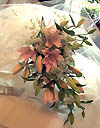Flower arrangements in May 2001
For mothers
 |
| The Sunday on the second week of May is known as a "mother's day"in Japan. Many people respect mothers and sending thanks with some gifts. When the"mother's day" created? I was very surprised to know that the ancient Greece has already a record regarding "mother's day". |
| May 4, 2001 | Backnumbers | |||
 |
A hand tied bouquet with yellow roses and
lace flowers by Kyoko |
April 2001 March 2001 February 2001 January 2001 Back numbers in 2000 In the United States Mother's Day was first suggested in 1872 by Julia Ward Howe (who wrote the words to the Battle Hymn of the Republic) as a day dedicated to peace. In 1907 Ana Jarvis began a campaign to establish a national Mother's Day. She persuaded her mother's church in Grafton, WV to celebrate Mother's Day on the second anniversary of her mother's death (the second Sunday of May) and began to write to ministers, businessman, and politicians in their quest to establish a national Mother's Day. By the year 1911 Mother's Day was celebrated in almost every state. In 1914 President Woodrow Wilson made the official announcement proclaiming Mother's Day as a national holiday that was to be held each year on the second Sunday of May. While many countries of the world celebrate their own Mother's Day at different times throughout the year, there are several countries that also celebrate Mother's Day on the second Sunday of May. Source: Holidays on the Net |
||
 |
Very basic style with a simple vase by Flora |
|||
 |
I can't forget about carnations at this time of the year. Red carnations are too strong, I prefer cream or oranges to match organdies. by Flora | |||
@ |
This is one of a easy-to-make bouquet. Just
bunch the gorgeous lilies and wrap with soft
organdies. How about sending your mother this bouquet and the soap of Aleppo? I like the Aleppo soaps very much. by Flora |
|||
| The earliest Mother's Day celebrations can
be traced back to those in ancient Greece
that honored Rhea, the mother of the gods.
During the 1600s, England celebrated a day
called "Mothering Sunday," which
honored the mothers of England. As Christianity
spread throughout Europe the celebration
changed to honor the "Mother Church."
Over time the two celebrations blended to
honor both mothers and the church. Now I see why mother's day is different between England and Japan/U.S. Naturally this was a difference of background. |
||||